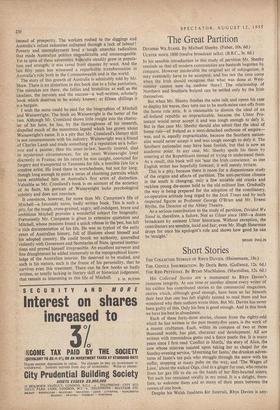The Great Partition
IN his sensible introduction to this study of partition Mr. Sheehy reminds us that all modern communities are bastards begotten by conquest. However intolerable the original act of subjugation, it may eventually have to be accepted; and has not the time come when the Irish should recognise that what was done at West- minster cannot now •be undone there? The relationship of Northern and Southern Ireland can be settled only by the Irish themselves.
But when Mr. Sheehy finishes the sales talk and opens his case to display his wares, they turn out to be moth-eaten cast-offs from the home rule attic. It is reasonable to dismiss the ideal of an all-Ireland republic as impracticable, because the Ulster Pro- testant would never accept it and was tough enough to defy it. But in that case Mr. Sheehy should also admit that the ideal of home rule—of Ireland as a semi-detached outhouse of empire— was, and is, equally impracticable, because the Southern nation- alist would never accept it and was tough enough to defy it. The Southern nationalist may have been foolish, but that is now an academic point. In any case, Mr. Sheehy spoils his thesis by sneering at the Republicans instead of trying to understand them. As a result, this book will not 'sear the Irish conscience,' as one English writer has hopefully forecast; it will merely irritate.
This is a pity, because there is room for a dispassionate study of the origins and effects of partition. The anti-partition climate in the south is changing; only a few amiable old cranks and reckless young die-easies hold to the old militant line. Gradually the way is being prepared for the adoption of the conciliatory, co-operative attitude long urged by the Irish Times and by such respected figures as Professor George O'Brien and Mr. Ernest Blythe, the Director of the Abbey Theatre. As a serious contribution to the study of partition, Divided We Stand is, therefore, a failure. Not so Ulster since 1800—a dozen broadcasts by eminent Ulster historians. Without exception, the contributors are sensible, lucid and fair; even Mr. Hugh Shearman drops for once his apologist's role and shows how good he can be 'straight.'
BRIAN INGLIS


































 Previous page
Previous page